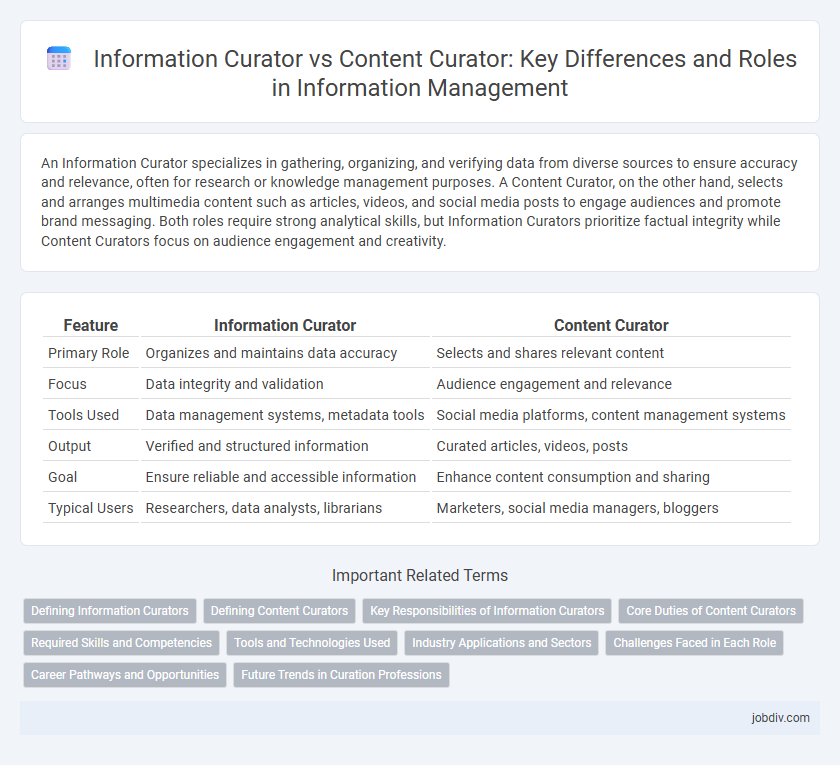An Information Curator specializes in gathering, organizing, and verifying data from diverse sources to ensure accuracy and relevance, often for research or knowledge management purposes. A Content Curator, on the other hand, selects and arranges multimedia content such as articles, videos, and social media posts to engage audiences and promote brand messaging. Both roles require strong analytical skills, but Information Curators prioritize factual integrity while Content Curators focus on audience engagement and creativity.
Table of Comparison
| Feature | Information Curator | Content Curator |
|---|---|---|
| Primary Role | Organizes and maintains data accuracy | Selects and shares relevant content |
| Focus | Data integrity and validation | Audience engagement and relevance |
| Tools Used | Data management systems, metadata tools | Social media platforms, content management systems |
| Output | Verified and structured information | Curated articles, videos, posts |
| Goal | Ensure reliable and accessible information | Enhance content consumption and sharing |
| Typical Users | Researchers, data analysts, librarians | Marketers, social media managers, bloggers |
Defining Information Curators
Information Curators specialize in gathering, organizing, and verifying data from diverse sources to ensure accuracy and relevance for decision-making processes. They employ advanced tools and methodologies to filter, categorize, and maintain high-quality information flows tailored to specific audiences or organizational needs. Unlike content curators, information curators focus primarily on data integrity and usability rather than on audience engagement or entertainment value.
Defining Content Curators
Content curators specialize in gathering, organizing, and presenting relevant information from various digital sources to engage specific audiences effectively. They filter vast amounts of data, ensuring accuracy and relevance while maintaining a consistent voice and style across platforms. Their role involves not just aggregation but adding value through contextualization and commentary to enhance user understanding.
Key Responsibilities of Information Curators
Information curators specialize in collecting, organizing, and maintaining accurate data sets to ensure easy accessibility and relevance for decision-making processes. They validate information sources, classify content with metadata, and continuously update repositories to preserve data integrity. Their responsibilities also include analyzing trends to enhance knowledge management systems and support organizational objectives.
Core Duties of Content Curators
Content curators specialize in discovering, organizing, and presenting relevant digital content to target audiences, ensuring material aligns with brand messaging and audience interests. They analyze trends, select valuable resources, and maintain a consistent publishing schedule across platforms to enhance engagement and drive traffic. Core duties include vetting sources for reliability, summarizing content, and integrating multimedia elements to create compelling presentations that boost user experience.
Required Skills and Competencies
Information curators must excel in data analysis, metadata management, and information architecture to organize and validate accurate data for retrieval. Content curators require strong editorial skills, audience understanding, and proficiency in digital marketing tools to create engaging, relevant content tailored to target demographics. Both roles demand critical thinking, attention to detail, and adaptability to evolving technologies and platforms.
Tools and Technologies Used
Information Curators utilize advanced data management platforms such as enterprise content management (ECM) systems, metadata repositories, and semantic search tools to organize and optimize large datasets. Content Curators often rely on social media management tools, content aggregation software, and editorial calendars to select, filter, and schedule digital content for target audiences. Both roles leverage AI-powered tools like natural language processing (NLP) and machine learning algorithms to enhance accuracy and relevance in organizing and presenting curated material.
Industry Applications and Sectors
Information curators specialize in collecting, organizing, and managing vast datasets for industries like healthcare, finance, and research, ensuring accurate and timely insights. Content curators focus on selecting and distributing relevant multimedia content tailored for marketing, media, and entertainment sectors to engage target audiences effectively. Both roles enhance decision-making processes, but information curation emphasizes data accuracy and accessibility, while content curation prioritizes audience relevance and engagement.
Challenges Faced in Each Role
Information Curators grapple with challenges such as ensuring data accuracy, managing vast datasets, and maintaining relevance amid rapidly changing information landscapes. Content Curators face difficulties in selecting engaging material, balancing diverse audience interests, and optimizing content for multiple platforms. Both roles require constant adaptation to evolving technologies and audience preferences to remain effective.
Career Pathways and Opportunities
Information curators specialize in organizing and managing data across digital and physical archives, often working in libraries, museums, or data centers, while content curators focus on selecting and sharing relevant digital media and articles for online platforms such as social media, blogs, and marketing channels. Career pathways for information curators lead to roles like archivist, records manager, and data librarian, emphasizing analytical and organizational skills, whereas content curators may advance to positions such as digital marketing strategist or social media manager, highlighting creativity and audience engagement expertise. Both fields offer opportunities in corporate, nonprofit, and governmental sectors, with growing demand driven by the need for efficient information management and targeted content delivery.
Future Trends in Curation Professions
Information Curators increasingly leverage AI-driven analytics and machine learning to organize vast datasets and enhance data accuracy, while Content Curators prioritize personalized, multimedia content delivery driven by evolving consumer behavior and platform algorithms. Future trends highlight a convergence where Information Curators apply semantic technologies for context-aware data curation, and Content Curators integrate augmented reality and immersive experiences to boost engagement. Both professions will require advanced digital literacy and continuous adaptation to AI advancements and evolving content ecosystems.
Information Curator vs Content Curator Infographic

 jobdiv.com
jobdiv.com